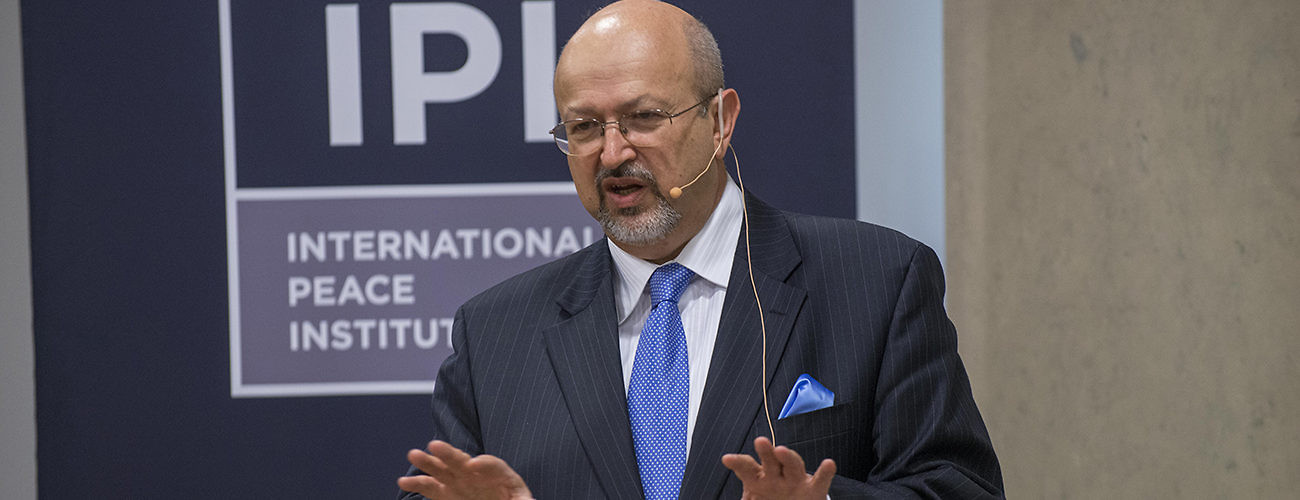Lamberto Zannier, the Secretary General of the Organization for Security and Co‑operation in Europe (OSCE), discussed the organization’s perspective on “Security Challenges in Europe,” at an IPI meeting, May 17, 2016.
With a membership of 57 countries and based in Vienna, the OSCE is the largest intergovernmental body in the world. Though nominally a security organization, the OSCE takes a comprehensive view of security, covering three dimensions—the politico-military; the economic and environmental; and the human. Participating states vow to uphold “respect for human rights and fundamental freedoms, including the freedom of thought.”
Despite these shared values, however, conflicts abound among its members. Zannier said a “return to geopolitics” after the Cold War presented a real challenge to the OSCE’s mission to help assure the security of Europe.
“We recognized at the OSCE, even before Ukraine, that we failed at achieving reconciliation after the Cold War,” he said. His reference was to the Russian annexation of Crimea from Ukraine in March 2014, condemned as an illegal land grab by the West.
All the nations involved the Ukraine crisis—Russia, Ukraine, the US and all 28 EU member states—are OSCE members.
Two months ago, his counterpart at NATO, Secretary-General Jens Stoltenberg, observed that there are what he called “profound disagreements” between NATO and Russia, and he added that “practical cooperation” was currently not possible.
From the OSCE’s point of view, this political climate “had to do with a lack of shared vision on European security after the Cold War,” Zannier said.
The “expansion of NATO was perceived by Russia as a threat to its security, so Russia started building its own security space,” he said. These rival security spaces “collided the various conflicts.”
He cited the Ukraine crisis as one such example of “differing visions” brought into conflict. But while the crisis itself remains unresolved,” he said, the OSCE has made much progress in the area. Ukraine was even the OSCE Chair in 2013, he pointed out.
Today the OSCE is “protecting election monitors in Ukraine, and can send international police,” to ensure a safe environment for voters, he said. The OSCE Special Monitoring Mission to Ukraine has been leveraged to produce a ceasefire, and reports on where the number of ceasefire violations is highest, such as in the Donetsk region, he said.
Similarly, with both Armenia and Azerbaijan among its members, the OSCE will play an important role in their politico- military dispute in Nagorno-Karabakh, he said. Speaking more generally about crises which emerged at the end of the Cold War like this one, he said the “best OSCE could do was try to freeze them somehow.”
An Italian career diplomat, Mr. Zannier was appointed OSCE Secretary General on July 1, 2011. From June 2008 to June 2011, he was UN Special Representative for Kosovo and Head of the United Nations Interim Administration Mission in Kosovo (UNMIK).
Zannier described mass migration to Europe as a “game changer,” and said he anticipated this being a long-lasting crisis. An estimated 650,000 migrants crossed the Mediterranean in 2015, according to the International Organization for Migration (IOM). The largest driver of that migration has been the conflict in Syria.
In response to all of this, some European nations that are members of the OSCE stand accused of building walls and fences when they should be building bridges. Refugees encounter vastly different responses in different European countries, often bouncing from one border area to another.
Several elements must be part of Europe’s plan to address these challenges, he emphasized. “For refugees and migrants, we need to deal with it with a complex strategy,” he said. This includes addressing not only organized crime, and terrorism, “but also taking into account demographic threats, disparities, and climate change.”
The event was held as part of IPI’s Global Leaders Series.
Warren Hoge, IPI Senior Adviser for External Relations, moderated the conversation.








